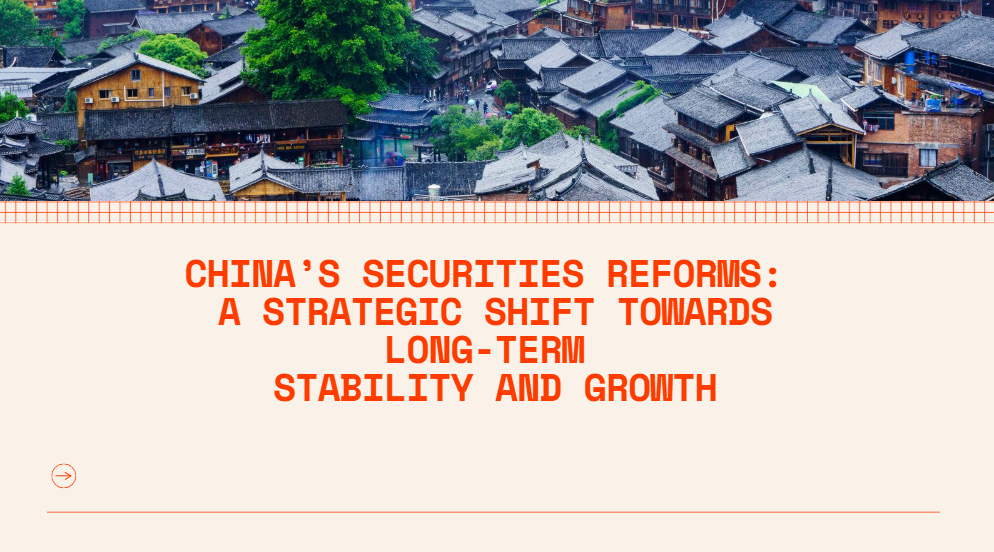China's New Private Sector Law: A Legal Reset for Market Confidence
On May 20, China's Private Sector Promotion Law will take effect, marking the country's first dedicated legislation for private businesses. Framed as a move to strengthen legal certainty, the law offers a rare window into how China is reshaping its policy architecture to support long-term market confidence—especially amid slowing growth and shifting investor expectations.
The law consolidates years of administrative guidance into a formal legal structure. With 78 articles spanning areas from market access and competition to finance and enforcement, it reflects a new institutional approach: less emphasis on policy campaigns, more on legal guarantees.
Clarifying Market Rules
One of the law's core messages is the reaffirmation of equal treatment for private businesses in all aspects of the economy. For years, many entrepreneurs and analysts have pointed to informal barriers—unequal access to land, data, financing, and public procurement—as challenges to fair competition. The new law codifies equal access to core resources and guarantees non-discriminatory treatment in licensing, bidding, and regulatory supervision.
The introduction of a unified national negative list for market access is especially noteworthy. Instead of relying on scattered local policies, businesses will now be guided by a consistent national framework. The principle is straightforward: what's not explicitly restricted is allowed.
These changes are not merely symbolic. In sectors like infrastructure, clean energy, and logistics—areas traditionally dominated by state players—private enterprises are gradually gaining ground. For instance, private capital already holds a 20% stake in China's nuclear power projects. In resource recycling and equipment upgrades, over 80% of investment comes from private firms.
Looking ahead, the government plans to launch approximately RMB 3 trillion (USD 416 billion) in public projects in 2025. Between January and April this year, private enterprises saw a 5-percentage-point increase in bid-winning rates. Of all projects under RMB 100 million, more than 80% were awarded to private firms.
The legal framework helps formalize these openings, ensuring that participation is not dependent on local discretion or informal relationships.

Finance and Credit Access
Access to credit remains a critical issue. While policy banks and local authorities have extended significant support in recent years, many smaller private firms continue to face structural constraints when approaching commercial lenders.
The law explicitly calls for improved financial services for private enterprises, especially small and medium-sized businesses. Regulatory authorities are now expected to ensure consistency in loan access, credit evaluation, and repayment mechanisms.
As of Q1 2025, outstanding loans to private firms reached RMB 76.07 trillion, up 7.41% year-on-year. Within that, inclusive financing loans to small and micro enterprises rose 12.5%, totaling RMB 35.3 trillion. Regulators attribute part of this growth to improved credit assessment tools and digital lending platforms.
Although the law does not set binding quotas, it provides a basis for businesses to challenge unfair lending practices and seek recourse when financial discrimination occurs.
Enforcement, Transparency, and Redress
The law also introduces clearer standards for regulatory enforcement. Over the years, inconsistent application of rules—especially at local levels—has been a frequent complaint among business operators.
In response, the Ministry of Justice has announced several supporting measures. These include standardizing inspection protocols, reducing overlapping enforcement actions, and formalizing channels for businesses to report regulatory overreach.
Importantly, oversight will no longer be left solely to internal administrative review. Legislators, legal professionals, and public representatives will play a role in evaluating enforcement practices. The law also outlines new systems for complaint handling, aiming to reduce uncertainty in business operations.
This gradual move toward external supervision reflects broader trends in regulatory modernization: predictable procedures, consistent standards, and clearer boundaries between administrative discretion and legal obligation.
From Policy Campaigns to Legal Commitment
Rather than introducing sweeping new incentives, the Private Sector Promotion Law signals a shift in tone. For years, support for private enterprise has come in waves—via slogans, pilot zones, and policy notices. While often well-intentioned, such measures have lacked durability.
Now, by embedding key commitments into national law, China appears to be offering a more permanent foundation. The law states that developing the private sector is a “long-term strategic policy,” a phrase that carries legal weight in China's legislative context. This positions private business not as a supplement to state-led growth, but as a core component of the economic system.
Institutionally, the law aligns with recent efforts to streamline the business environment, unify market rules, and reduce hidden barriers. These are all prerequisites for building a more mature, competitive, and rules-based economy.





















































First, please LoginComment After ~